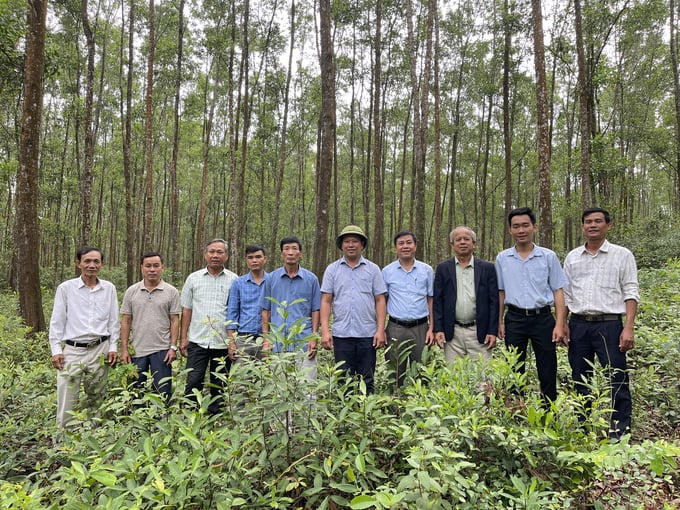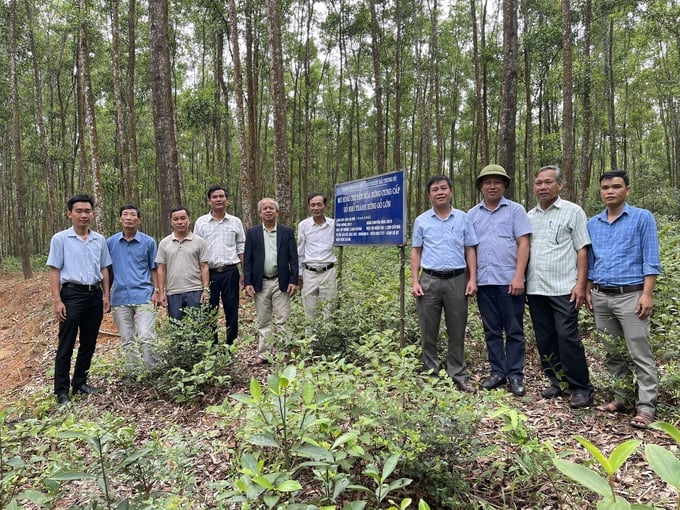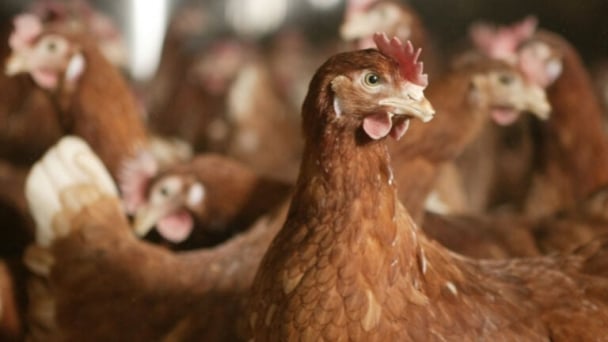June 24, 2025 | 08:01 GMT +7
June 24, 2025 | 08:01 GMT +7
Hotline: 0913.378.918
June 24, 2025 | 08:01 GMT +7
Hotline: 0913.378.918
The event saw the participation of over 80 delegates, including leaders from the Quang Tri province's Department of Agriculture and Rural Development, the North Central Forestry Science Center (Vietnam Academy of Forest Sciences), the Quang Tri province's Agricultural Extension Center, the Quang Tri province's Sub-Department of Forest Protection, and numerous local cooperatives, community extension officers, producers within forest material planting areas.
According to the Resolution of the 17th Quang Tri Provincial Party Congress for the 2020-2025 term, the province has designated afforestation and forestry development as priority tasks. Namely, Quang Tri aims to improve the productivity, quality, and value of planted forest timber products; prioritize and develop towards large timber forests that comply with international FSC standards; establish linkages between processing businesses and material areas; and establish value chains. Furthermore, the province targets a total concentrated forest area of between 6,500 and 7,000 hectares per year, with a stable forest coverage of 49.4%. Consequently, Quang Tri plans to become a central hub for planted forest material provision and timber processing in Central Vietnam.

Participants at the seminar visiting a large timber plantation model. Photo: Viet Toan.
During the seminar, participants discussed the effectiveness of transitioning to large timber plantations in association with forest certification; agricultural extension efforts in developing intensive large timber material areas; new forestry technical advancements in the context of intensive large timber plantation in the North Central region; and the necessary steps to promote the development of timber material areas in association with sustainable certification.
Boasting a total planned forest and forestry land area of nearly 277,900 hectares, Quang Tri province, with support from the the Vietnam Administration of Forestry (formerly the General Department of Forestry) and the National Agricultural Extension Center, has successfully implemented numerous large timber plantation models and converted small timber plantations to large timber since 2014.
The models have received commendations by experts from the Ministry of Agriculture and Rural Development and the National Agricultural Extension Center for their practicality and effectiveness. They serve as demonstration sites to share experiences, provide training, and organize on-site seminars for forest owners and residents within and outside the province.
To date, the area of large timber production forests and converted large timber forests in Quang Tri province has reached nearly 18,050 hectares (including over 4,250 hectares of newly planted large timber forests and nearly 13,800 hectares converted large timber forests). Additionally, the province has established an FSC-certified plantation timber supply chain between forest owners and companies with CoC certification, such as Thu Hang Wood Processing Company, Nguyen Phong Company, Quang Tri Trading Company, and Scansia Pacific Company (Ho Chi Minh city). These businesses have committed to purchasing the entirety of FSC-certified timber output from the Quang Tri FSC Association and cooperatives at prices 10 to 12 percent higher than non-certified timber.

The model for converting small timber forests to large timber, implemented by the Forest Science Center for North of Central Vietnam (Vietnam Academy of Forest Sciences) in Quang Tri province. Photo: Viet Toan.
According to Phan Van Phuoc, Deputy Director of the Quang Tri province's Department of Agriculture and Rural Development, the local agricultural sector, forest owners, residents, and authorities have promoted various forest development activities with a focus on intensive forest planting to enhance the productivity and quality of planted forests; thereby effectively utilizing the land's potential.
The agricultural sector in Quang Tri province has provided consultations for the Provincial People's Committee on the issuance of support policies, and the development of key crops, livestock species with competitive advantages for the years between 2022 and 2026. These policies include annual support for cooperatives, farmers, and households that plant large timber forests, with a maximum of 1,000 hectares per year, in association with the implementation of FSC certification.
Deputy Director Phan Van Phuoc requested the province's Agricultural Extension Center to continue promoting information dissemination, encouraging residents to transition from small timber to large timber forests; to enhance forestry extension, training, and the transfer of technical advancements in large timber plantation; to develop demonstration models for large timber plantations with hybrid acacia; and to convert small timber to large timber forests. Additionally, he emphasized the importance of high-quality seedlings in promoting the province's capacity to supply large timber. Accordingly, Quang Tri aims to become a central hub for planted forest material provision and timber processing in Central Vietnam.
Translated by Nguyen Hai Long

(VAN) Research has shown that Hy-Line brown hens may be better suited for cage-free production based on overall greater egg production and other quality metrics.
![Turning wind and rain into action: [9] Digitizing hydrometeorological data in response to climate change](https://t.ex-cdn.com/nongnghiepmoitruong.vn/608w/files/news/2025/06/17/z6704423696987_15fd32ffc26d590d204d520c9dac6786-nongnghiep-165943.jpg)
(VAN) Farmers have begun accessing hydrometeorological applications to adjust their cropping schedules, aiming to ensure productivity and adapt to climate change.
![Turning wind and rain into action: [8] Real-time salinity detection and early warning technology](https://t.ex-cdn.com/nongnghiepmoitruong.vn/608w/files/news/2025/06/17/z6704423696987_15fd32ffc26d590d204d520c9dac6786-nongnghiep-151127.jpg)
(VAN) Thanks to the integration of modern hydrological-hydraulic models, remote sensing technologies, and artificial intelligence, the accuracy of hydrological forecasting has significantly improved.
![Turning wind and rain into action: [7] Early disaster warnings help marine farmers minimize losses](https://t.ex-cdn.com/nongnghiepmoitruong.vn/608w/files/news/2025/06/17/z6704423696987_15fd32ffc26d590d204d520c9dac6786-nongnghiep-142942.jpg)
(VAN) In recent years, thanks to early disaster warnings and forecasting, marine farmers in Khanh Hoa province have been able to reduce risks and losses, thereby improving production efficiency.
![Turning wind and rain into action: [6] ‘Four on-the-spot’ disaster management software](https://t.ex-cdn.com/nongnghiepmoitruong.vn/608w/files/news/2025/06/17/e5a48259d6a262fc3bb3-nongnghiep-183800.jpg)
(VAN) By simply activating the scenario on the disaster management software, the relevant authorities immediately know how many households need to be evacuated, where to evacuate them to, and by what means of transportation…
![Turning wind and rain into action: [5] Hue applies modern technology in disaster forecasting](https://t.ex-cdn.com/nongnghiepmoitruong.vn/608w/files/news/2025/06/17/z6704423696987_15fd32ffc26d590d204d520c9dac6786-nongnghiep-093938.jpg)
(VAN) In Hue city, modern technology has recently been applied in meteorological and hydrological forecasting and warning, helping to reduce the damage caused by natural disasters.

(VAN) A cutting-edge farming technique being implemented on an experimental ranch in Arizona's Sonoran Desert has already saved a billion gallons of water over five years, according to Civil Eats.